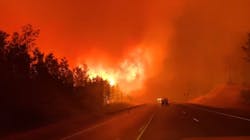Watch Cars Avoid Flames Driving Through AK Wildfire
Fueled by a warm, dry summer, Alaskan wildfires have raged for nearly three months, and two of the largest fires in the country are devastating the state. Overall, Alaska has the second-most active wildfires in the United States—seven—behind Arizona, which has eight.
The Swan Lake fire—now the biggest U.S. wildfire—was sparked by lightning on June 5, and as of Wednesday, it has destroyed more than 160,000 acres near Sterling, along Alaska's Kenai Penninsula, AccuWeather reports. It's joined in severity by the Ethel Creek fire, a blaze that began July 11 and has burned nearly 20,000 acres about 50 miles northeast of Nondalton, according to the National Interagency Fire Center, which tracks wildfires around the country.
“In a short amount of time, these wildfires have already cost dozens of Alaskan families everything they own," Gov. Mike Dunleavy said in his statement last week issuing a disaster declaration. "Many homes, personal belongings, and businesses are completely gone, and the disruption brought to their lives is unimaginable.”
Dunleavy and other state and local officials have strongly discouraged people from traveling in the area of the Swan Lake fire because of the dangers involved trying to navigate through the thick smoke and flames. Those risks were dramatically evident in an online video—shared this week by ViralHog and Accurweather—showing cars driving under a burnt-orange sky while pillars of flames shot over the trees lining the roadway.
As of Tuesday, more than 650 firefighters were battling the Swan Lake wildfire on the ground while helicopters were attacking the flames by air, the Anchorage Daily News reports. Those efforts have contained about 20% of the blaze, so far.
Since the Swan Lake fire started, it has cooled off in areas, but high winds earlier in the month reignited flames in those spots and increased its overall size. Forecasts continue to point toward extremely warm and dry weather, and fire officials aren't sure when that will change to allow the Swan Lake fire's strength to diminish, according to AccuWeather.
